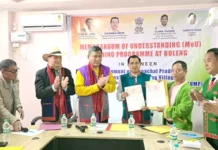ITANAGAR, Jun 28: A group of Idu Mishmi people from Lower Dibang Valley and Dibang Valley districts have expressed dissent over the construction of the Etalin hydroelectric project (HEP).
In a representation to Tribal Affairs Minister Arjun Munda on Friday, the group said that the wildlife conservation plan prepared by the Wildlife Institute of India (WII) for the Etalin HEP “is incorrect and scientifically biased.”
Quashing the report, the group said, “It cannot be used to inform decision-making on this project as a recent peer review by 29 Indian scientists found that it contained shocking inaccuracies, falsehoods and contradictory claims, in addition to the fact that it conveniently skipped the mandated ‘multi-seasonal study’ and instead conducted a short four-month survey on ‘mutually agreeable terms’ with the project developer (Jindal Power Ltd).”
The group added that “their unprincipled assessment has essentially given a green signal to the project by falsely stating that there is no evidence of tigers in the region.”
Expressing disagreement with the WII report, the group said that the “forest advisory committee (FAC) accepted the report which obliterated the tigers of Dibang Valley, but instead included African bats, not found in India.
“Such blatant falsehoods by a supposedly scientific institute are shameful,” it said.
The FAC of the environment ministry on 23 April accepted the WII’s Etalin study in toto, despite the reported inaccuracies and falsehoods, the group said.
Also rejecting the assurance for compensatory afforestation, the group said no amount of compensation could replace the essential forest ecosystems that would be lost due to the mega dam.
“This project would not only risk future disease outbreaks, it will surely further accelerate climate change,” it added.
Stating that the region exhibits high seismicity and lies within Seismic Zone V as per the IS Code (IS 1893, Part 1: 2002), the group asked whether the Etalin HEP and the many other projects proposed in the Dibang basin would be able to withstand seismic events of a magnitude greater than 8.6.
The group also expressed fear of the indigenous people losing their identity due to the influx of labourers that would be needed to construct the dam.
“Such huge numbers of workers will no doubt outweigh the population of the Idu-Mishmi and neighbouring communities,” the group said, and added that “the threat from the influx of labour force is not just social, economic, political and cultural; it is existential.”
“We understand the nuances of developmental projects but we strongly resist the imposition of ‘development’ that threatens our very existence, takes away our rightful ownership of our own lands, risks culture and biodiversity, and exposes our future generations to a vulnerable, impoverished and uncertain future,” the letter read.



